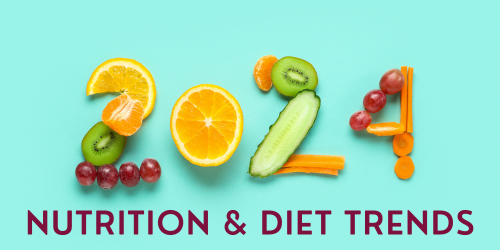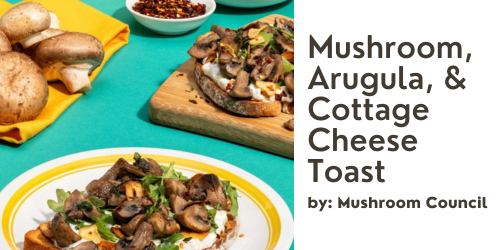As we embark on a new year, the ever-evolving landscape of diet and nutrition brings forth exciting trends shaping our approach to wellness. In this ever-evolving landscape, our understanding of health, nutrition, sustainability, and the intricate relationship between our bodies and the food we consume continues to unfold. Over the years, we've witnessed the ebb and flow of nutritional paradigms. As we usher in the new year, it's clear that the journey toward optimal well-being continues to emerge. Keep reading to discover the top nutrition and diet trends for 2024. Here's to a year of vibrant health and a deeper understanding of the nourishment that fuels your body and empowers your life! -Stephanie
|
|
|
2024 Nutrition and Diet Trends
|

- Plant-Power: Embracing plant-based diets continues to gain momentum, with a surge in innovative plant-based proteins and a spotlight on diverse plant sources. From legumes to ancient grains, the options for plant-centric meals are expanding, offering health and sustainability benefits.
- Gut Health Revolution: The link between gut health and well-being takes center stage. Probiotics, prebiotics, and fermented foods are key players in promoting a healthy gut microbiome. Expect an influx of gut-friendly products and a deeper understanding of how gut health impacts immune function and mental wellness.
- Personalized Nutrition: Advances in technology enable a more customized approach to nutrition. From DNA testing to personalized meal plans, individuals can tailor their dietary choices based on genetic predispositions and specific health goals, unlocking a new era of precision nutrition.
- Mindful Eating and Non-Diet Approach: Beyond calorie counting, a holistic approach to nutrition incorporates mindfulness and mental well-being. Awareness of the mind-body connection leads to practices like intuitive eating, emphasizing a balanced and mindful relationship with food.
- Tech-Enhanced Wellness: The integration of technology in nutrition is on the rise, with the advent of smart kitchen appliances, nutrition apps, and wearables. These tools empower individuals to track and optimize their dietary habits, fostering a more informed and connected approach to health.
- Functional Foods: You will continue to see emerging foods that offer functional benefits beyond essential nutrition. Whether it's ingredients with immune-boosting properties, adaptogens, or anti-inflammatory compounds, the demand for foods that support specific health outcomes is growing.
- Sustainable Eating: Environmental consciousness continues to influence dietary choices. From reducing food waste to choosing eco-friendly packaging, the emphasis on sustainable eating practices aligns with the growing awareness of the impact of our food choices on the planet.
|
|
|
Deciphering Nutrition Facts From Fads
|

As you navigate the evolving landscape of diet and nutrition in 2024, it's essential to understand the difference between science-based nutrition and trends. Here are a few tips to help you decipher the nutrition facts from fads.
- Evidence-Based Information: Rely on information backed by scientific research from reputable sources. Peer-reviewed studies, health organizations, and registered dietitians provide reliable insights into nutrition.
- Critical Evaluation: Question sensationalized claims and be cautious of overly optimistic promises. Genuine improvements in health and nutrition are typically gradual and sustainable.
- Consider the Source: Evaluate the credibility of the source. Peer-reviewed journals, government agencies, and established health organizations are generally more reliable than individual blogs or marketing materials.
- Beware of Quick Fixes: Be skeptical of diets or products promising rapid results. Sustainable health improvements involve long-term lifestyle changes, not quick fixes.
- Personalization Matters: Recognize that nutritional needs vary among individuals. A one-size-fits-all approach may not be suitable. Consult with a healthcare professional or a registered dietitian for personalized advice.
- Be Mindful of Marketing Language: Be cautious of terms like "miracle," "magic," or "revolutionary." Legitimate nutritional advice is often more measured and doesn't rely on hyperbolic language.
- Consult Professionals: When in doubt, seek guidance from healthcare professionals, such as registered dietitians, who can provide evidence-based advice tailored to your needs.
By adopting a discerning approach and staying informed, you can navigate the noise of nutrition fads and make choices that contribute to your long-term health and well-being.
|
|
Featured Recipe
Mushroom, Arugula, and Cottage Cheese Toast
|

Recipe by: Mushroom Council
Ingredients:
- 2 Tablespoon olive oil
- 3 cloves garlic, thinly sliced
- 1 pound crimini mushrooms, cleaned and quartered
- 1 teaspoon chopped fresh thyme, plus more for garnish
- Kosher salt and freshly ground black pepper, to taste
- 1/2 cup cottage cheese
- 2 slices sourdough bread, toasted
- 1/2 cup baby arugula
- Crushed red pepper flakes, for garnish
Instructions:
- Heat oil in a large skillet over medium-high heat. Add garlic, and cook, stirring frequently, until light golden-brown, about 30 seconds to 1 minute. Transfer garlic, using a slotted spoon, to a paper-towel-lined plate and let drain. Set aside.
- Add mushrooms to the same skillet and cook, stirring occasionally, until golden brown, about 6 to 8 minutes. Stir in thyme, and season with salt and pepper to taste.
- Meanwhile, combine cottage cheese, salt, and pepper in a medium bowl until combined. Spread cottage cheese mixture evenly over each slice of bread. Top evenly with arugula, mushrooms, reserved garlic, additional thyme, and crushed red pepper flakes. Serve and enjoy.
Serves 2
Nutrition Facts: 334 calories, 16 grams fat, 427 mg sodium, 37 grams carbohydrates, 3 grams fiber, 15 grams protein
|
|
|
Be Inspired
|
|

|
|
|
About SO Nutrition
|
 Stephanie Leipprandt Ouellette, MBA, RDN, LD
Stephanie Leipprandt Ouellette, MBA, RDN, LD Stephanie has been working in the field of nutrition and dietetics since 1995. She earned a Bachelor of Science degree in Dietetics from Michigan State University, completed an Approved Pre-Professional Practice Program at Western Michigan University and earned a Master of Business Administration from Baker College. She’s been a Registered Dietitian Nutritionist since 1996 and licensed in Texas since 2007. In 2008, Stephanie earned her certification in Childhood and Adolescent Weight Management. Stephanie has extensive clinical & managerial experience, both in corporate settings and in the community. Now she wants to share her knowledge with you, because most (if not all) nutritional habits begin at home.
Stephanie and her family reside in Katy, Texas
|
|
| |
Copyright © 2024 Customized Nutrition Newsletters, All rights reserved.
|
|
| |
|
|